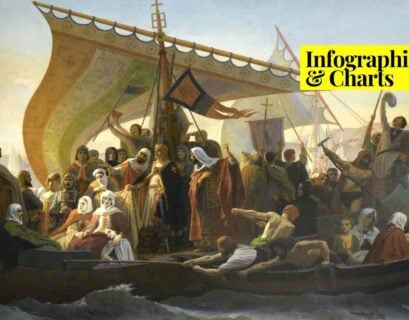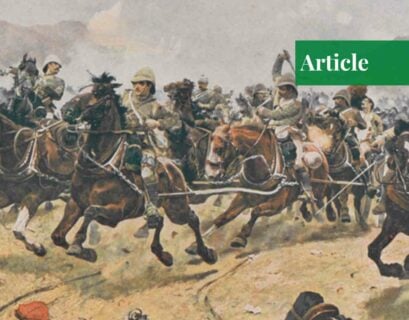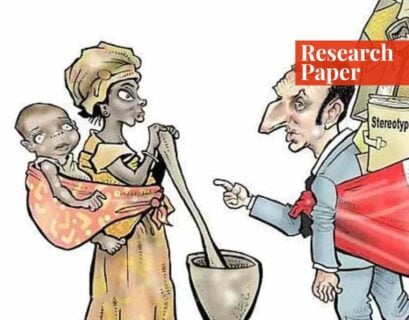Ms Duaa Ayaz is a graduate of Economics and Social Sciences. She is currently working as a freelance writer on Fiverr. Her sphere of interest includes international relations, geopolitics, foreign policy, security, and socio-economic issues of Pakistan and the world.
Introduction
Historian David Wetzel in his book ‘A Duel of Nations: Bismarck, Napoleon III, and the Origins of the Franco-Prussian War’ argues that the Franco-Prussian War of 1870 was the result of a power struggle between France and Prussia for control of the German Confederation. Others note that the war was a product of the complex set of political, economic, and social factors that existed in Europe at the time, and that it was not solely the result of a single cause.
The desire for national unity and the desire to assert national identity were major factors that were brewing in the belly of the volcano that eventually erupted as the Franco-Prussian War. The Franco-Prussian War is also adjudged as the last event that accomplished not only the unification of German states and the proclamation of the German Empire but also the unification of Italy. It was a strife that culminated in a decisive victory for the Prussian-led German states and the defeat of French troops at the Battle of Sedan.
Europe on the Eve of War
Before the Franco-Prussian War of 1870, Europe was characterized by a balance of power among the major European powers, with France, Great Britain, Russia, and Austria-Hungary possessing the status of the most powerful nations. Politically, Europe was divided into several political systems, with monarchies, republics, and empires coexisting in one continent.
Socially, In the 1800s, nationalism enflamed passions all across Europe followed by the emergence of a politically active working class. Economically, Europe was experiencing a period of rapid industrialization and economic growth. Furthermore, Europe was driven by a quest for conquests and competition among the power centres for occupying colonies and territories around the world, precipitating mistrust and conflict among the major powers.
The Role of Key Players
The origin of the Franco-Prussian War of 1870 can be traced back to the mid-19th century when Prussia began occupying various ethnically German territories forming the North German Confederation. In a bid to compete for the control of southern territories, various key players contributed significantly to the beginning of the war.
Otto von Bismarck, Architect of German Unification
The most prominent among all the key figures of the conflict was the Prussian Chancellor Otto von Bismarck, the mastermind of German unification and the driving force behind Prussia’s diplomacy during the war. An opportunist, he engineered a series of conflicts including the Austro-Prussian War of 1866 and the Franco-Prussian War of 1870-1871, to achieve this goal.
He was known for his ability to manipulate international relations to achieve Prussia’s lofty ambitions. A staunch advocate of German unification, Bismarck desired to expand Prussia’s sphere of influence, by aiming to incorporate the southern German states of Bavaria, Wurttemberg, Baden, Saxony, etcetera into a unified Germany.

However, France firmly opposed the idea of German unification because that would challenge France’s hegemony in the region. Furthermore, France also had claims over the southern German states as per the 1865 Biarritz promise. This vision of the 1870 war was epitomized by Bismarck as stated in the quote: “I knew that a Franco-Prussian War must take place before a united Germany was formed.”
In order to accomplish his dream of German unification, Bismarck sought to invoke German nationalism among the masses, which was only viable if France initiated the war. This was necessary so that the southern German states would stand by Prussia, solidifying German power. Bismarck was also successful in isolating France diplomatically, in addition to securing the neutrality of Russia.
Helmuth von Moltke, Prussian War Strategist
On the Prussian side, ‘Helmuth von Moltke’, the Chief of the Prussian General Staff, also played a key role in the Franco-Prussian War. He was responsible for planning and executing the Prussian war strategy leading Prussia to victory.
Napoleon III, Emperor of France
On the French side, Emperor Napoleon III, leader of the Second French Empire, was the driving force behind France’s decision to go to war, and his leadership played a major role in the outcome of the conflict. Furthermore, the increasing opposition to Napoleon III in France necessitated the declaration of war on Prussia. Hence, the Emperor fell into the trap laid by Bismarck.
Louis-Jules Trochu, Defender of France
Louis-Jules Trochu, another important player on the French side, was a French general who was appointed as the President of the Government of National Defence during the war. He was responsible for the defense of Paris during the Siege of Paris.
Causes of the Franco-Prussian War of 1870
The Franco-Prussian War of 1870-1871 was the result of a complex set of political, economic, and social factors.
Role of Nationalism
Nationalism was a powerful force in Europe in the 19th century, and both France and Germany were seeking to assert their own national identities. The German states, led by Prussia, were seeking to unify and create a powerful German nation, while France was seeking to maintain its status as a major European power.
The Longstanding French-Prussian Rivalry

The animosity emanating from factors including economic competition, territorial disputes, and political differences ignited the tensions between the two countries in the years leading up to the war. Historian William Carr in his book ‘The Origins of the Wars of German Unification’ argues that the war was the result of a long-standing rivalry between France and Prussia and the culmination of a series of France’s diplomatic errors.
Economic Interests
The economic interests of both France and Prussia played a role in the outbreak of war. Prussia was seeking to gain control of the rich iron and coal resources of Alsace-Lorraine, while France was seeking to protect its own economic interests in these regions.
Candidacy of Prince Leopold of Hohenzollern-Sigmaringen to the Spanish Throne
The candidature of Prussian Prince Leopold of Hohenzollern for the throne of Spain became a threat to France, for it would mean that the territory would become sand-witched by unfriendly states (a subsequent Prussian-Spanish alliance).
The EMS Telegram
The EMS telegram was sent by King William (on account of French ambassador Bernadette’s demand for a written apology for Leopold’s candidature) to Bismarck who then manoeuvred the EMS telegram so as to deliberately provoke the French side. The telegram created war hysteria on both sides, leading to France’s declaration of war on Prussia
The war began with a surprise attack by the Prussian army on the French border and quickly escalated into a full-scale conflict. The Prussian army, led by Chancellor Otto von Bismarck and Field Marshal Helmuth von Moltke, was able to defeat the French army in a series of battles, culminating in the Siege of Paris, prompting Paris’ surrender.
The war ended with the Treaty of Frankfurt, which imposed heavy reparations on France and the cession of the provinces of Alsace and Lorraine to Germany. In the famous Hall of Mirrors at Versailles in 1871, the King of Prussia was declared the Emperor of Germany.
Shaping Modern Europe
Unification of Germany
The war paved way for the consolidation of German states, giving birth to the mighty German Empire (among the most powerful states of Continental Europe then), with Berlin supplanting Paris as the nucleus of global politics. This unification was formalized by the 1871 Treaty of Versailles, which created the German Empire and made Prussia the leading state within it.
Before the war, the German states were politically and economically diverse and had little sense of a unified identity. However, the impending war prompted cooperation and coordination among the German states, which helped foster a sense of national unity.
On the economic front, historian David Stevenson claims that the war was a key event in the emergence of a new kind of industrial society in Germany, characterized by a strong centralized authoritarian state, a powerful economy, and a rapidly growing population. The victory in the war demonstrated the strength of the German economy and led to an increase in international trade.
The war also led to the annexation of Alsace-Lorraine, which was an important industrial and agricultural region. The region bolstered the German economy, expediting the influx of more German citizens into the country and creating a diverse and cosmopolitan society.
Furthermore, the war diminished the influence of the traditional German nobility, which had previously held significant power in the German states. It engendered a claim for a more democratic and egalitarian society thus influencing German culture.
Repercussions for France
Historian J.P.T. Bury, the author of ‘France, 1814-1940’, asserted that the war led to the decline of the French and other European powers including the Ottoman Empire, and the rise of the German Empire, which in turn led to a more aggressive and expansionist foreign policy by Germany.
The annexation of Alsace-Lorraine by Germany was a significant blow to French pride and would be a source of tension between the two countries for decades to come. In her debut book ‘Under the shadow of defeat: the war of 1870-71’, historian Dr. Karine Varley ruminates on the Franco-Prussian War, arguing how the defeat of France shaped the political culture and identity of French society.

The vanquishment of the French army led to a loss of national pride and a sense of betrayal among the people. This led to a cauldron of anarchic sentiment and a desire for political and social change. The Third Republic was marked by a shift towards a more democratic and secular government, laying great emphasis on individual rights and freedoms in French culture.
Furthermore, the rise of widows and orphans post-war ripped apart the social fabric of France significantly, thus engendering the feminist movement which called for greater rights and opportunities for women. There was a significant decline in the influence of the Catholic Church as people began to criticise the Church’s role in the war and its effectiveness in helping the people.
The war also led to the large-scale displacement of people, particularly in regions of France that were occupied by German troops, inducing a refugee crisis that strained the social welfare system. Additionally, the war jeopardized the French economy. The war effort required a large mobilization of resources, which led to inflation and a shortage of goods.
The war also led to the destruction of infrastructure and industry, leading to a decline in economic activity and a rise in unemployment. It took several decades for France to fully recover from the economic damage caused by the war.
Impact on Military Tactics
The Franco-Prussian War had a profound impact on the development and evolution of military tactics. The Prussian army used new tactics such as the offensive defense and the use of railways to transport troops and supplies, which were adopted by other armies in Europe and around the world in years to come.
Impact on International Relations and European Diplomacy
The defeat of France in the war had a profound impact on international relations for it typified the downfall of French hegemony in Europe and the emergence of Germany as a major power in the continent. The war also led to a shift in the balance of power in Europe, which had far-reaching implications for the future of European diplomacy.
Impact on Alliances
The war led to the formation of the Triple Alliance between Germany, Austria-Hungary, and Italy, and the formation of the Triple Entente between France, Russia, and later, Britain. These alliances would later play a significant role in the outbreak of World War I.
In a Nutshell
The Franco-Prussian War of 1870 holds eminence as the war that shaped modern Europe and built the academic substructure of European diplomacy as well as the International Relations discipline. The conflict not only rescinded the geopolitical norms in Europe but also led to the development of the modern state. It also had a profound impact on the political, social, and economic landscapes of both France and Germany and had far-reaching implications for modern Europe.
If you want to submit your articles and/or research papers, please check the Submissions page.
The views and opinions expressed in this article/paper are the author’s own and do not necessarily reflect the editorial position of Paradigm Shift.



















